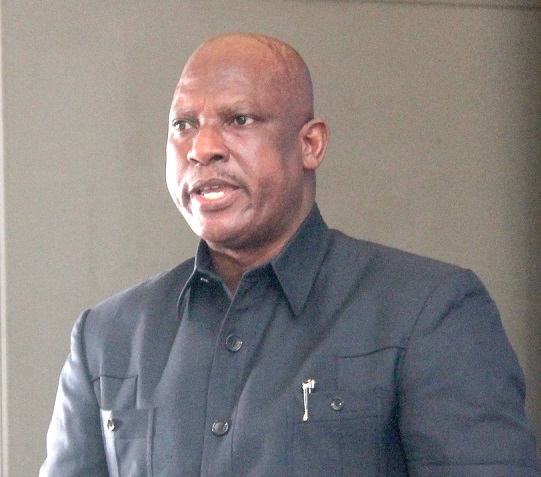
Graphic Business-Stanbic Bank Breakfast Meeting: E-Service opportunity to tackle corruption - Graphic MD
The Managing Director of the Graphic Communications Group Limited (GCGL), Ato Afful, has observed that E-service in the form of E-governance platforms presents what he described as a great opportunity to tackle corruption in the country.
He said E-governance had proven to have a positive impact in the fight to curb corruption because it improved transparency and reduced middle men in transactions.
Advertisement
Mr Afful made the observation as he set the stage for the start of the Graphic Business-Stanbic Bank Breakfast Meeting held in Accra last Tuesday.
The thought-leadership programme, which has grown to become one of the major agenda-setting events on the national calendar, offers a platform for experts in various fields to discuss critical and relevant topics that has the potential to contribute to economic and social growth.
On the theme, “Integration of E-Service into our economy: Implications for economic growth,” Tuesday’s meeting was the first of four quarterly events scheduled for the year to throw the spotlight on topics that bothers on the economy.
Mr Afful noted that an analysis on the “Impact of E-governance on corruption” found that as the use of ICT –related governance increased, corruption decreased.
“If E-governance can minimise corruption, then the country can make savings for development with the resultant positive impact on the living standards of the people,” he said.
The Graphic MD said digitilisation was rapidly becoming a new way of engaging globally, as the world was fast becoming more dependent on the Internet.
The offshoot of this phenomenon, he said, was that services and commerce were also becoming technology and mobile based.
He said Ghana, like many other countries, had responded by making significant shifts in integrating E-service into the economy.
E-service on the economy
Mr Afful said E-service offered a big global market with huge economic value.
Citing an UNCTAD report on “Estimates of global E-commerce,” he noted that global E-commerce stood at $26.7 trillion in 2019, up by four per cent over the 2018 figure, representing 30 per cent of global Gross Domestic Product (GDP).

Out of that, cross border business to consumer E-commerce also stood at $440billion in the period under review, representing a nine per cent increase over the 2018 values.
Additionally, there was $1.4 8billion online shoppers worldwide with 360 million shopping across borders.
“This market place gives Ghanaian entrepreneurs the chance to tap into global markets without necessarily staging a physical presence abroad.
“The African Continental Free Trade Area (AfCFTA) is also good for the economy in terms of potential wealth creation.
However, we have to plan and be nimble in seizing these opportunities across categories,” he said.
Further, Mr Afful said E-service had implications for the economy in terms of job creation as it relied on ICT tools because digitalisation was the bedrock of E-service.
He said consequently, ICT professionals would have expanded job options and ICT-related businesses had the potential to expand their services in terms of offering.
Economic transformation
The Brands and Marketing Manager at Stanbic Bank, Mawuko Afadzinu, noted that the COVID-19 accelerator changed the entire narrative of a seismic change instead of a gradual transformation.
He noted that in the world now, digital transformation had hugely impacted on the economy to the extent that one of the biggest drivers of the transformation in every economy was what happened in the digital space.
“Not only is it a driver but a major stimulant of the constantly evolving world we find ourselves today. Therefore, we do not have much of an option when it comes to the adoption of digital technology.
“It is a choice we have to make in terms of how we apply the opportunities that are created and how we leverage them in a way that will stimulate the economy in ways which will make us comfortable,” he said.
He added that, “When the economy is good, we all feel good and when it is difficult, we all feel it directly.”
Mr Afadzinu gave an assurance of the bank’s commitment to support everything that drives the economy “and which translates into positively to impact the pockets of the ordinary people”.





